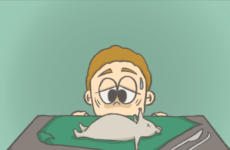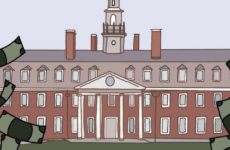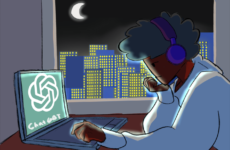
By Francesca Howard ’26
According to the National Organization for Women (NOW), two in three adolescent girls are dissatisfied with their body image. This alarming statistic reveals an unsettling trend that demands urgent attention and decisive action.
This issue was only exacerbated during the Covid-19 lockdown. Data from the National Institute of Health (NIH) in 2020 demonstrate that eating disorder symptoms worsened among adolescents. Hospitalizations linked to eating disorders skyrocketed over the past few years, with cases among teenage girls almost doubling. While disordered eating can affect individuals across all genders and age groups, it usually manifests in young girls, typically between the ages of 12 and 25. Adolescents in this developmental period of life are particularly susceptible to being infiltrated by social media’s emphasis on physical appearance.
At Choate, these factors converge and inadvertently contribute to the School’s culture of unhealthy eating habits. In the context of a boarding school, where students reside in a close-knit community, the pressure to achieve the beauty standard is magnified. Away from the watchful eyes of parents, students can make decisions about their meals without any interference. Breakfast, lunch, and dinner are not mandatory, and students can choose when, what, or if they will eat.
However, this decision-making is often influenced by peer pressure. When in the dining hall, I often overhear troubling conversations surrounding food. Whether it is one girl asking her friend if she’s “really going to eat that” or two others comparing their body shapes and sizes, harmful interactions like these occur daily.
Teens under such scrutiny may find themselves trapped in an incessant cycle of comparison to their peers. It doesn’t help that Choate’s academic rigor inherently fosters a hyper-competitive atmosphere.
As an interscholastic squash player, my health and fitness have always been a priority in my life, but it has become an overwhelming concern after coming to Choate. I would constantly feel anxious about the potential of gaining weight for fear that others would view me differently. I found myself regularly checking the mirror throughout the day to make sure my hair wasn’t unkempt and that a blemish hadn’t appeared. I made sure to always dress in clothes that were flattering and shrouded my insecurities.
Conversations like these were all too frequent and practically inescapable. Sometimes it would be as simple as somebody commenting: “back for seconds?” or people jokingly calling others “fattie.” However, as time went on and I settled into life at Choate, I found that body shaming was not limited to just conversations in the dining hall; the problem was deeply intertwined with campus culture.
The prevalence of hookup culture and objectification greatly contributes to the stigma around weight. I often overhear boys in my form discussing girls’ bodies and rating them on a scale from 1-10. However unnecessary and disgusting this may be, boys’ opinions matter to some girls, who then feel like they need to conform to their standard of beauty.
Disordered eating is also embedded in students’ values of competitiveness and perfectionism. Choate students are expected to excel academically, athletically, and socially. This rigorous atmosphere often translates into students having an unhealthy relationship with food and exercise. For instance, coaches of sports teams place a heavy emphasis on physical appearance, encouraging athletes to “trim down.”
Beyond these conversations, there were also more overt signs of body dysmorphia within the student body. A friend of mine refused to eat anything that wasn’t “clean,” meaning free from any processed ingredients or added sugars. She would spend hours meal-prepping each week, constantly rambling on about the metabolism supplements she was taking. Dining with her made me more conscious of disordered eating and body image issues. Girls my age know what it’s like to look in the mirror and not be satisfied with what they see. This realization may have been solemn, but it was also the wake-up call that I desperately needed, and one that Choate must heed.
For me, coming to Choate was a revelation; it helped me understand that the insecurities I experienced growing up extended far beyond the walls of any one institution. This issue is not unique to our school and is a broader societal problem.
By promoting open and meaningful dialogue and cultivating a supportive environment, Choate can better reach struggling students. It is also imperative to encourage a culture that values diversity and embraces individuality. By challenging current expectations and striving for inclusivity, Choate can flourish as an environment where students are celebrated and valued for their unique selves.
The alarming statistics and trends of body dissatisfaction and disordered eating among teenage girls convey an urgency to acknowledge and address this matter. Choate, as an educational institution, is responsible for its students. While the School has already made strides in addressing these issues through club-based activities, there is always room for improvement.
By recognizing the potential factors that exacerbate body dissatisfaction, such as its unique boarding school setting, and by taking measures to promote a healthier environment, Choate’s Administration can better protect the next generation of students. Only through collective action can we foster a society where teens flourish without the burden of body image concerns.




